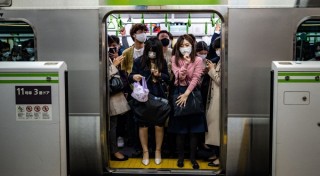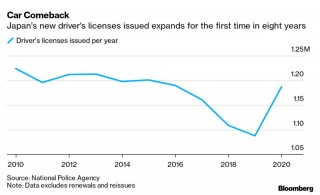Loading
Search
▼ Hyperdrive Daily: Japan Is Getting Back Into The Driving Seat
- Category:Other
Behind the Wheel
I’m River Davis, a transport reporter based in Tokyo, and am stepping in this week in place of our usual column from Beijing. A year into the pandemic here, people are itching to get out of their homes, but they’re reluctant to ride the city’s notoriously crowded public transport network.Instead, residents are rushing to get themselves driver’s licenses and preparing to get behind the wheel. That’s a significant shift for a nation where the number of motorists has plateaued over the past decade, which is among key factors that’ve weighed on new car sales.
It’s a trend I’ve seen first hand recently, while standing in line to have my own foreign license converted to a local permit at a center on the western outskirts of Tokyo. There, waiting times to take a driving test now stretch longer than a month, from a week or two at most previously.
The pandemic is changing attitudes to public transport the world over, as people shun commutes on packed trains or buses for the enclosed, private spaces of their own cars. That’s particularly true in Tokyo, where upward of 10 million people a day jammed the city’s 13 subway lines before the spread of Covid-19.
The morning rush on some routes is famously intense, and stations have long employed oshiya – or pushers – to physically cram more passengers into each carriage.
A total of 85% of respondents to a poll last year said that life during the Covid-19 outbreak had shown them the importance of having their own vehicle, according to PwC Japan. And it’s clear many are already taking action.
The number of new driver’s licenses issued in Japan increased in 2020 for the first time in eight years, according to Japan's National Police Agency. Much of that growth came from people aged in their 20s and 30s. More qualified drivers should mean a healthier domestic car market. Toyota, the world’s No. 1 automaker, expects sales in Japan will rise in the current fiscal year, while PwC is forecasting a spike in first-time vehicle-purchases.
Until recently, young people had been leading the country’s shift away from car ownership, happy to rely on the abundant public transport options in major cities. The trend even has a name in Japanese, “wakamono no kurumabanare,” or the youth’s turn away from cars.
Toyota, along with local competitors like Nissan and Honda, will be hoping that once a generation of potential new consumers jumps into the driver’s seat, they’ll choose to stay there.
Before You Go
The sight of gas stations running dry last week following the Colonial Pipeline cyberattack won’t send motorists rushing out to buy electric models, but it’ll have more of an impact than supply shocks in the past, Bloomberg’s Kyle Stock writes. Consumers who would’ve previously shrugged off price swings — or lines at the forecourt — finally have a range of affordable alternatives to combustion engine vehicles.
At the very least, the latest incident “plants more seeds” in the minds of potential EV drivers, according to Nick Nigro, executive director of Atlas Public Policy.
- May 17, 2021
- Comment (0)
- Trackback(0)




